

A PhD timeline for finishing quickly [Free Gantt Download]
Navigating the labyrinthine journey of a PhD program is no small feat.
From the day you step into your graduate program as a bright-eyed doctoral student, you’re immediately thrust into a complex weave of coursework, research, and milestones.
By the second year, you’ve transitioned from coursework to research, laying the groundwork for your dissertation—a pivotal component in your scholarly endeavour.
Come the third year, you face the critical oral examination, a hurdle that could make or break years of hard work.
But how does one streamline this multifaceted journey? The answer lies in a well-planned PhD timeline.
This blog serves as an invaluable guide for any PhD student looking to complete their doctoral studies efficiently, walking you through each milestone from coursework to graduation.
How to Begin with the PhD Timeline Planning?
Planning your PhD timeline is an essential first step in your PhD program.
Success in any PhD program depends, to a large extent, on effective time management and keeping track of progress through a thoughtfully crafted PhD timeline.
Start with outlining all your major requirements:
- coursework,
- dissertation,
- and the expected time needed for each task.
I also highly recommend factoring in failure time – give yourself a little bit of wiggle room for when things, invariably – go wrong.
It’s crucial to remain realistic about the time you can commit daily or weekly while keeping long-term goals in mind.
Regular check-ins on your PhD timeline and supervisor will help you stay on track and allow you to adapt if necessary.
Adjustments may be needed as you progress through your PhD program, but having a timeline as a guide can make the journey less daunting and more achievable.
Elements to include in a 3-year PhD timeline
The initial stage in this timeline typically involves coursework, often lasting one year, where the student engrosses themselves in advanced study in their chosen field.
Once the coursework is done (USA PhDs), they focus on proposing, conducting, and presenting their initial research.
By the end of the second year, most students should have a clear direction for their dissertation, a core component of the PhD process.
In this third and final year of the PhD timeline, the student focuses primarily on completing their dissertation, which involves collecting data, analyzing results, and organizing their research into a substantial, original, and cohesive document that contributes to contemporary knowledge in their field.
Regular reviews and modifications of the PhD timeline may also be necessary to accommodate various unpredictable circumstances, thus making this timeline both a guide and a flexible workplan.
It is a significant tool in successfully navigating the maze of becoming a PhD holder.
Create Your PhD Timeline for a 3 year completion
Creating a timeline for a 3-year PhD program requires careful planning, as you’ll have multiple milestones and tasks to complete.
This timeline may vary depending on your specific field, institution, or country, but here is a general outline you can use as a starting point:
| Year & Quarter | Activity/Milestone | Description | Outcome/Output |
|---|---|---|---|
| Admission & Onboarding | Formalities for joining the program, including orientation. | Official start of the program. | |
| Initial Literature Review | Familiarize yourself with the existing research in your field. | Foundation for your research. | |
| Coursework | Complete required or optional courses. | Credits/Education | |
| Research Proposal Outline | Develop a draft outline for your PhD proposal. | Outline for proposal | |
| Coursework & Seminars | Continue with coursework and attend relevant seminars. | Credits/Education | |
| Meet with Advisor | Discuss research interests and outline. | Feedback for refinement | |
| Complete Research Proposal | Finalize your research proposal with your advisor’s input. | Approved Proposal | |
| Ethics Approval (if needed) | Submit proposal for ethics approval if required. | Ethics Clearance |
| Year & Quarter | Activity/Milestone | Description | Outcome/Output |
|---|---|---|---|
| Data Collection | Start gathering data according to your proposal. | Initial Data | |
| Intermediate Review | Review progress with advisor. | Feedback for refinement | |
| Data Analysis | Start analyzing the collected data. | Preliminary Findings | |
| Draft Chapters | Start writing initial chapters of your thesis. | Draft Chapters | |
| Further Analysis | Conduct additional analysis if necessary. | Refined Findings | |
| Publish/Conference | Consider publishing initial findings or presenting at a conference. | Paper/Presentation | |
| Complete Data Collection | Finish gathering all necessary data. | Finalized Data | |
| Update Thesis Draft | Update your thesis draft with the complete analysis. | Updated Draft |
| Year & Quarter | Activity/Milestone | Description | Outcome/Output |
|---|---|---|---|
| Thesis Writing | Focus primarily on writing your thesis. | Near-final draft | |
| Peer Review | Have peers or mentors review the thesis draft. | Feedback for refinement | |
| Thesis Submission | Finalize and submit your thesis for review. | Submitted Thesis | |
| Defense Preparation | Prepare for your thesis defense. | Defense Presentation | |
| Thesis Defense | Defend your thesis in front of a committee. | Committee’s Decision | |
| Revisions (if needed) | Make any revisions recommended by the committee. | Final Thesis | |
| Final Submission | Submit the finalized thesis. | PhD Thesis | |
| Graduation | Complete any remaining formalities. | PhD Awarded |
Free Gantt chart excel template
Here is a free template you can modify for your own research:
Example Gantt chart for a USA PhD
Here are some common steps involved in completing a PhD, which I’ll use to create the Gantt chart:

- Orientation and Coursework (Semester 1) : Familiarization with the university, department, and coursework.
- Coursework (Semester 2) : Continued coursework and possible teaching/research assistantships.
- Select Advisor and Research Topic : Usually done towards the end of the first year or the beginning of the second year.
- Preliminary Research : Initial research and literature review.
- Complete Coursework (Semester 3) : Wrap up any remaining required courses.
- Research Proposal : Develop a full research proposal including methodology.
- Qualifying Exams : Exams to transition from a Ph.D. student to a Ph.D. candidate.
- Begin Research : Start of actual research based on the approved proposal.
- Conduct Research : Data collection, experiments, and analysis.
- Intermediate Review : A review to assess the progress of the research.
- Write Papers : Start writing papers and possibly publishing in journals.
- Finalize Research : Final experiments and data analysis.
- Write Dissertation : Writing the actual Ph.D. dissertation.
- Dissertation Defense : Defending the dissertation before the committee.
- Graduation : Completing all requirements and graduating.
Example Gantt chart for a UK, European and Australian PhD
For Ph.D. programs outside the United States, especially in Europe and some other parts of the world, students often go straight into research without the need for coursework. Here are some common steps for such programs:

- Orientation : Familiarization with the university and department.
- Select Advisor and Research Topic : Usually done at the beginning of the program.
Wrapping up
The journey to earning a PhD is complex and demanding, filled with academic milestones from coursework to research to dissertation writing.
The key to a smooth and efficient doctoral journey lies in well-planned time management—a structured PhD timeline.
This blog serves as an invaluable guide, offering detailed tips for planning out each academic year in both U.S. and international PhD programs. It emphasizes the importance of starting with an outline of major requirements and factoring in “failure time” for unforeseen challenges.
For those looking to navigate their PhD journey in three years or beyond, having a flexible but comprehensive timeline can be the compass that guides them successfully through the academic labyrinth.
Whether you’re just starting out or already deep into your research, the principles and strategies outlined here can help streamline your path to that coveted doctoral hood.

Dr Andrew Stapleton has a Masters and PhD in Chemistry from the UK and Australia. He has many years of research experience and has worked as a Postdoctoral Fellow and Associate at a number of Universities. Although having secured funding for his own research, he left academia to help others with his YouTube channel all about the inner workings of academia and how to make it work for you.
Thank you for visiting Academia Insider.
We are here to help you navigate Academia as painlessly as possible. We are supported by our readers and by visiting you are helping us earn a small amount through ads and affiliate revenue - Thank you!

2024 © Academia Insider

Planning your PhD research: A 3-year PhD timeline example

Planning out a PhD trajectory can be overwhelming. Example PhD timelines can make the task easier and inspire. The following PhD timeline example describes the process and milestones of completing a PhD within 3 years.
Elements to include in a 3-year PhD timeline
What to include in a 3-year PhD timeline depends on the unique characteristics of a PhD project, specific university requirements, agreements with the supervisor/s and the PhD student’s career ambitions.
For instance, some PhD students write a monograph while others complete a PhD based on several journal publications. Both monographs and cumulative dissertations have advantages and disadvantages , and not all universities allow both formats. The thesis type influences the PhD timeline.
The most common elements included in a 3-year PhD timeline are the following:
The example scenario: Completing a PhD in 3 years
Many (starting) PhD students look for examples of how to plan a PhD in 3 years. Therefore, let’s look at an example scenario of a fictional PhD student. Let’s call her Maria.
In order to complete her PhD programme, Maria also needs to complete coursework and earn 15 credits, or ECTS in her case.
You may also like: Creating awesome Gantt charts for your PhD timeline
Example: planning year 1 of a 3-year PhD
Most PhD students start their first year with a rough idea, but not a well-worked out plan and timeline. Therefore, they usually begin with working on a more elaborate research proposal in the first months of their PhD. This is also the case for our example PhD student Maria.
Example: Planning year 2 of a 3-year PhD
Example: planning year 3 of a 3-year phd, example of a 3 year phd gantt chart timeline.
Combining the 3-year planning for our example PhD student Maria, it results in the following PhD timeline:
Final reflection
In fact, in real life, many PhD students spend four years full-time to complete a PhD based on four papers, instead of three. Some extend their studies even longer.
Master Academia
Get new content delivered directly to your inbox, 10 amazing benefits of getting a phd later in life, how to prepare your viva opening speech, related articles, 10 reasons to do a master’s degree right after graduation, 25 short graduation quotes: inspiration in four words or less, 3 sample recommendation letters for brilliant students, pursuing a non-thesis master’s degree: is it worth it.

How to Prepare Actionable PhD Research Plan Template
“Where PhD is highly uncertain, an actionable PhD research plan would give you calculative and tentative outcomes. And even more, the ready-to-use template makes things even better. Let’s take a close look at the research plan + template.”
Before moving forward, it’s important to understand the process and steps in research . Then only you can make an actionable plan for your PhD research. It’s literally like driving without breaks— that you don’t want.
In a broader sense, when you plan something, it shows two things: first, you are actually serious about the work you are planning and second, you are expecting some outcomes. And by a plan, you are heading towards it.
I know, plans may not work 100% all the time, but they may create a definite path to achieve at least 80% success in the work you are doing. This is also true for a PhD— in which you would constantly try to justify a single sentence– your research title.
So– Yes, the research process is undetermined and so the results too! but here is the catch and perhaps answer why you have to have a research plan. In this article, I will explain the importance of a research plan, an actionable research plan and a ready-to-use template for you.
How to prepare an actionable research plan?
Importance of phd research plan , wrapping up.
An actionable research plan is what you have to rely upon. So it should be perfect and approved. how can you prepare your own? Let’s see.
Understand the steps in the research and closely follow them.
Define the objectives and scope of your study.
Define each goal of your study– For example, sample collection, wet lab work, standardization, experimentation, data collection and interpretation, etc.
Enlist what types of problems you may face for each goal– For example, transportation for sample collection, Lack of facilities in wet lab work, etc.
Find a solution for each problem you have enlisted– For example, appoint an expert for sample collection and transport samples in a cold chain. If your lab doesn’t have some instruments or chemicals, priorly contact other labs and ask them for help.
Draw a rough road map for your work— the route using which you will achieve your research goals. Also, make a backup. What if the route or process you selected would not work? Check out this drawing to understand my point.
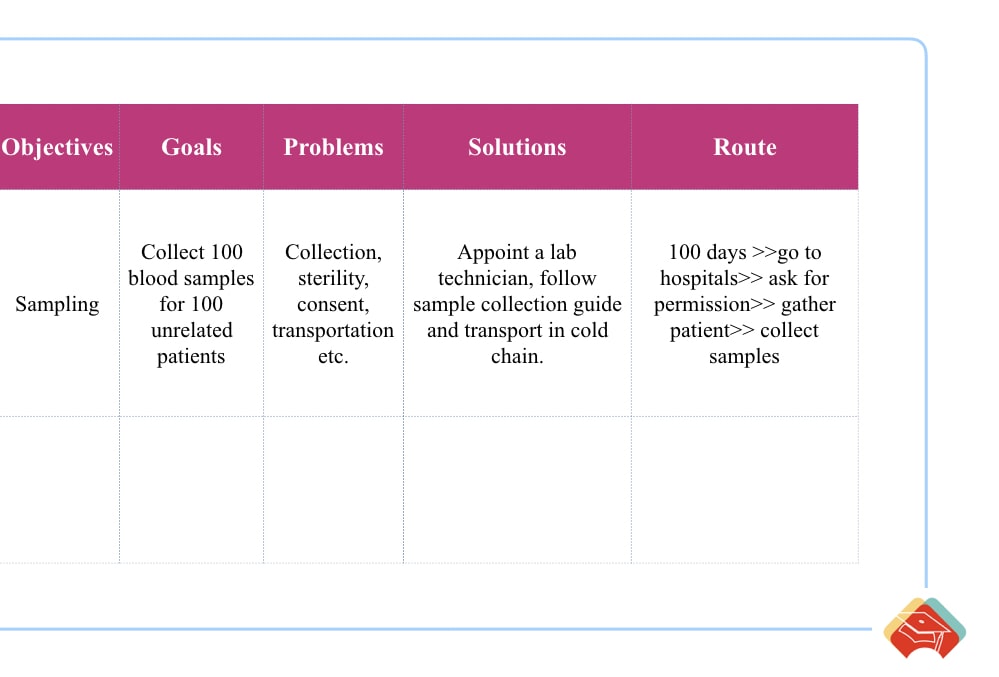
Now prepare a timeline— in how much time a particular goal should be achieved. For example, 6 Months for sampling (Including, ethical approval, approval from sampling authority, consent, preparation and arrangement for utilities).
Another is sample collection— 3 Months which isn’t covered in the 6 months of sampling objective, like this. Take a look at the drawing here.
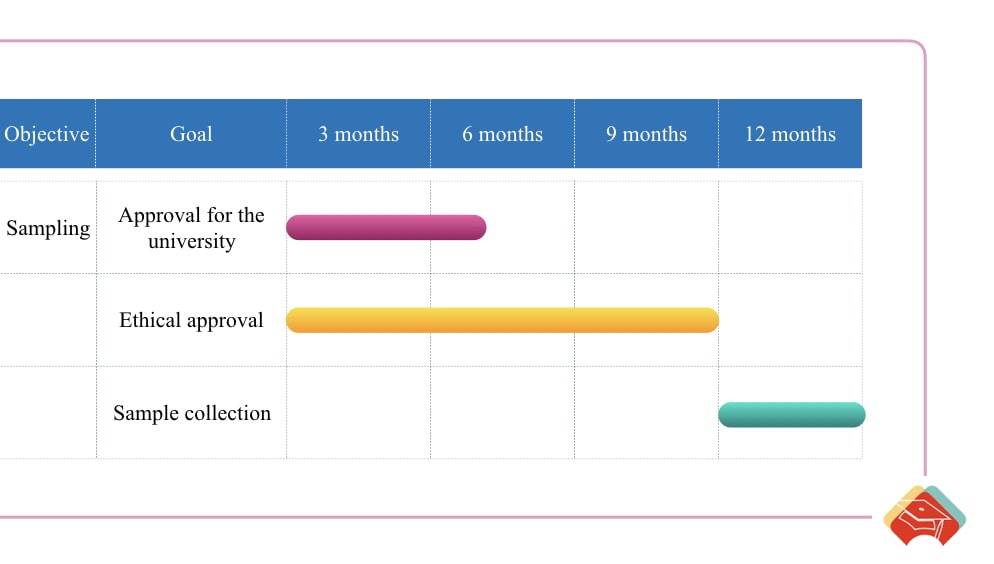
Note: This timeline must match with your GANTT chart for PhD timeline because you are making an actionable plan.
Now your plan is reading. You are now aware of each objective, goal and problem. Some you probably solved, and some you can manage later. This you can print and stitch in your logbook or can save on your desktop.
Take a look at the advantages, and why it’s important to prepare an action plan.
Related article: How to Prepare a PhD Research Plan/Schedule?
Let’s start with two real-world examples first.
One of my friends, after sample collection and initiating the testing, found out that she also has to perform hormone assays for samples. The samples she collected are 3 months old— not possible to assess quantitative analysis.
Another colleague after sample collection– when he started working in the wet lab, came to know that one important instrument is not there in their lab. His guide is very serious about the goal that they have to do it anyhow.
He sent applications to various universities and research centers to work on that particular instrument. From approval to real testing, it tools all almost 8 months including, approval, training, transportation, etc.
Wasted much time!
- An actionable research plan saves your time— which is a crucial factor in PhD.
- It makes you aware of the pros and cons of your study.
- It makes you aware of the problems and limitations of the research you conduct.
- It gives you a broad roadmap to achieve your PhD in “some” tentative time.
- It gives you the flexibility to achieve goals and enjoy your time at the same time.
- You can make real-time monitoring of how your research is going and how much work is left.
- It makes you aware of what should be your next move and the preparations you required.
However, keep in mind that once you prepare a plan, review it from your guide, take their advice, enlist major objectives and techniques you would use for the study and stick to it.
Before preparing that, read the literature regarding your topic and understand the way in which your research should be headed.
Check out our fully customizable, ready-to-use and actionable research plan template.
Download a research plan template
These things look a bit old school but it works, really works well. Most students don’t do it and end up messing things and at last, came to know that they wasted their time. At least, the research plan will tell you where you are stuck (probably) and you can find a solution.
We know how hard it is to predict the future of PhD or how it would go. But let me tell you, with an actionable plan, many do well. And you can too. Take your doctorate seriously from day one. And do accordingly.
Remember your goal should be to complete your degree in time.

Dr. Tushar Chauhan is a Scientist, Blogger and Scientific-writer. He has completed PhD in Genetics. Dr. Chauhan is a PhD coach and tutor.
Share this:

- Share on Facebook
- Share on Twitter
- Share on Pinterest
- Share on Linkedin
- Share via Email
About The Author

Dr Tushar Chauhan
Related posts.

A Definite Research Process for PhD- What Students Should Know?

What are Research- Aim, Objectives, Tasks/Goals? [Our System]
Leave a comment cancel reply.
Your email address will not be published. Required fields are marked *
Save my name, email, and website in this browser for the next time I comment.
Notify me of follow-up comments by email.
Notify me of new posts by email.

How to plan, structure and write every chapter in your PhD
In this collection, we’ll walk you through each chapter of your thesis. You’ll learn what goes where and how it fits together.

The PhD Discussion Chapter: What It Is & How To Write It
Your PhD discussion chapter is your thesis's intellectual epicenter. Think of it as the scholarly equivalent of a courtroom closing argument, where you summarise the evidence and make your case. Perhaps that’s why it’s so tricky - the skills you need in your...

Everything you wanted to know about structuring your PhD but were too afraid to ask
Understanding how to structure your PhD is tough. It helps to break it down into four distinct sections. In this guide, we explain how.

How to find the thread that runs through your PhD thesis
You probably worry about finding the thread that runs through the PhD thesis. In this guide we walk you through what’s required.

How to edit a PhD thesis (without going mad)
Your thesis takes a lot of time to research, ideate, and write. Here’s how to properly edit a PhD thesis such that you impress your examiners and achieve even greater success.

The 9 most effective ways to achieve PhD success
Writing a PhD is physically, intellectually and emotionally daunting. You may spend each day doubting yourself, not sure if you’re making the right choices and unsure whether you’ve got what it takes. During my life, I’ve helped thousands of PhD students like...

How To Structure A PhD Thesis
Struggling to understand what goes where? Let us walk you through a non-nonsense guide that’ll teach you how to structure a PhD thesis.

The difference between empirical and discussion chapters (and how to write them)
There is a very important distinction that needs to be made between the empirical and discussion sections/chapters. It is a common misconception that the empirical chapters are the place for your analysis. Often this confuses the reader.

Five tips to improve your PhD thesis
Regardless of what stage of the writing process you are at, there are five overarching tips you need to keep in mind if you want to improve your PhD thesis.

What are you doing and how are you doing it? Articulating your aims and objectives.
How long does it take the person reading your thesis to understand what you’re doing and how you’re doing it? If the answer is anything other than ’in the the opening lines of the thesis’, keep reading.

Learn how to write a PhD proposal that will stand out from the rest
When stripped down to its basic components, the PhD proposal explains the what and the why of your research. What it will be about and why it will be important.

Easily understand how to write a PhD thesis introduction
Get the introduction right and the rest of your dissertation will follow. Mess it up and you’ll be struggling to catch up. The introduction is the place to factually recount what it is you will be discussing in the thesis. Learn more in this detailed guide.

Last impressions count – writing your PhD thesis conclusion
The conclusion is the last thing your examiner will read before they write their viva report. You need to make sure it stands out.

What is a dissertation abstract and how do I write one for my PhD?
Don’t underestimate how hard it is to write a PhD thesis abstract. When I wrote mine I though it’d be straightforward. Far from it. It’s tricky. You have to condense hundred of pages and years of work into a few hundred words.

Russian (dolls) to the rescue – how to structure an argument in your PhD
At the core of the PhD are arguments. Lots of them. Some more important and some very specific. When you understand how to structure an argument, your thesis reads clearly and logically. If you don’t the reader ends up confused and your thesis suffers.

Drowning in a sea of authors – How to be critical in a PhD literature review.
Don’t get lost in a sea of authors when you write your PhD literature review. Instead be critical. In this guide we explain how.

Wrestling an elephant into a cupboard: how to write a PhD literature review in nine easy steps
When I was writing my PhD I hated the literature review. I was scared of it. I thought it would be impossible to grapple. So much so that it used to keep me up at night. Now I know how easy it can be and I’m sharing my top tips with you today.

A Template To Help You Structure Your PhD’s Theoretical Framework Chapter
In this guide, I explain how to use the theory framework template. The focus is on the practical things to consider when you’re working with the template and how you can give your theory framework the rockstar treatment.

How To Structure A PhD With Our PhD Writing Template
Our PhD Writing Template allows you to visualise your PhD on one page. Here we explain how to fill it in and how it can help you structure each chapter.

Eureka! When I learnt how to write a theoretical framework
The theoretical framework is so important, but so misunderstood. Here we explain it is in simple terms: as a toolbox.
Explore Other PhD Knowledge Base Collections
Eight collections of free resources to help you along the phd journey.

Mastering your theory and literature review chapters

How to structure and write every chapter of the PhD

How to stay motivated and productive

Techniques to improve your writing and fluency

Advice on maintaining good mental health

Resources designed for non-native English speakers

Explore our back-catalogue of motivational advice
Each week we send out a short, motivational email to over 4,000 students. Here you can sign up and access the archive.

A free one-page PhD structure template

How to Make a Study Plan in Graduate School
This guide will walk you through the process of creating a study plan and provide you with tips and tricks to ensure that your time in graduate school is more productive, efficient, and enjoyable. A successful study plan starts with prioritizing tasks and setting goals.
A study plan is not just for personal use – it’s also a great tool for roommates, friends, professors, advisers, mentors. It clearly lays out what you’re planning to do so that everyone knows how best to support you on your journey of intellectual development.
Once you have a study plan, it’s easy to keep track of the progress you’ve made completing goals and tasks. Students who are able to regularly check in with their study plan find that they are more confident in their abilities and less anxious about the amount of work required to graduate.
To have a successful graduate school experience, it is important to be organized and productive. Often, there is confusion as to how to best allocate your time between classes and studying for classes, jobs, additional coursework (i.e. M.A./M.S. degree), and other obligations such as taking care of family members, maintaining an apartment/house, and going to gym regularly (if you are lucky enough to have a gym membership).
A study plan can help keep you on track with your daily responsibilities by providing a breakdown of what you must do each day and each week. The structure presented by a study plan helps you focus on what needs to be done versus what would be nice to accomplish.
6 Ways to Create a Study Plan
1. make the study plan public.
A study plan is not a private document or a scheduling guide that is meant to be used by your professors and/or advisers. Rather, it should be designed by you to help guide your study process and goals.
2. Write on the calendar
If at all possible, create daily and weekly plans for staying on track with your assigned classes as well as other responsibilities (family, housework, gym membership, etc).
3. Make your study plan visible
Be sure when you do prepare a study plan, you make it as visible as possible to other grad students. For example, keep it in a visible place such as on your fridge or by the front door so that others can see it. You may very well be assigned a critique group or give a conference presentation on your thesis research, so be sure to include that information in the plan so that others can better understand what you are working on and how they can help you.
4. Keep a copy of the plan at all times
You may find that having a copy of the study plan (on paper or in electronic format) with you at all times may help you stay on track and achieve your goals and tasks.
5. Write your goals and tasks down
Write your goals, tasks and daily /weekly schedule down on the calendar (see above for how to organize this information) as well as in your own journal/blog. This will help keep you motivated, it will keep you organized, and it will remind you to do the things you need to do.
6. Use a personal checklist
A personal checklist helps students who find it difficult to write down all of their daily tasks and goals because they find that they have so many responsibilities (i.e. classes and jobs). By using a personal checklist, you can simply write down all of your daily tasks and goals and then check them off when they are completed. You can often find a typed out version of such a personal checklist online (i.e. this sample worksheet).
How to use It:
Keep it simple at first by only including the bare minimum of your daily tasks and goals. As your study plan becomes more complex, add more tasks and goals.
- What to Consider Before Moving to Another Country?
- Is It Possible To Make Friends In Graduate School Abroad?
- How to Develop a Relationship With you Advisor in Grad School
- How do I Gain Confidence in Graduate School?
- Can You Get into Grad School with a Low GPA?
- Is it hard to make friends in the UK?
- Can You Get a Scholarship as an African American?
- Can I Work and Study in Australia? A Guide to Doing Both
- How to Approach a Professor for Graduate Research
- Can I Work As A Freelancer In Australia?
Leave a Comment Cancel reply
Save my name, email, and website in this browser for the next time I comment.
How to write a research proposal
What is a research proposal.
A research proposal should present your idea or question and expected outcomes with clarity and definition – the what.
It should also make a case for why your question is significant and what value it will bring to your discipline – the why.
What it shouldn't do is answer the question – that's what your research will do.
Why is it important?
Research proposals are significant because Another reason why it formally outlines your intended research. Which means you need to provide details on how you will go about your research, including:
- your approach and methodology
- timeline and feasibility
- all other considerations needed to progress your research, such as resources.
Think of it as a tool that will help you clarify your idea and make conducting your research easier.
How long should it be?
Usually no more than 2000 words, but check the requirements of your degree, and your supervisor or research coordinator.
Presenting your idea clearly and concisely demonstrates that you can write this way – an attribute of a potential research candidate that is valued by assessors.
What should it include?
Project title.
Your title should clearly indicate what your proposed research is about.
Research supervisor
State the name, department and faculty or school of the academic who has agreed to supervise you. Rest assured, your research supervisor will work with you to refine your research proposal ahead of submission to ensure it meets the needs of your discipline.
Proposed mode of research
Describe your proposed mode of research. Which may be closely linked to your discipline, and is where you will describe the style or format of your research, e.g. data, field research, composition, written work, social performance and mixed media etc.
This is not required for research in the sciences, but your research supervisor will be able to guide you on discipline-specific requirements.

Aims and objectives
What are you trying to achieve with your research? What is the purpose? This section should reference why you're applying for a research degree. Are you addressing a gap in the current research? Do you want to look at a theory more closely and test it out? Is there something you're trying to prove or disprove? To help you clarify this, think about the potential outcome of your research if you were successful – that is your aim. Make sure that this is a focused statement.
Your objectives will be your aim broken down – the steps to achieving the intended outcome. They are the smaller proof points that will underpin your research's purpose. Be logical in the order of how you present these so that each succeeds the previous, i.e. if you need to achieve 'a' before 'b' before 'c', then make sure you order your objectives a, b, c.
A concise summary of what your research is about. It outlines the key aspects of what you will investigate as well as the expected outcomes. It briefly covers the what, why and how of your research.
A good way to evaluate if you have written a strong synopsis, is to get somebody to read it without reading the rest of your research proposal. Would they know what your research is about?
Now that you have your question clarified, it is time to explain the why. Here, you need to demonstrate an understanding of the current research climate in your area of interest.
Providing context around your research topic through a literature review will show the assessor that you understand current dialogue around your research, and what is published.
Demonstrate you have a strong understanding of the key topics, significant studies and notable researchers in your area of research and how these have contributed to the current landscape.
Expected research contribution
In this section, you should consider the following:
- Why is your research question or hypothesis worth asking?
- How is the current research lacking or falling short?
- What impact will your research have on the discipline?
- Will you be extending an area of knowledge, applying it to new contexts, solving a problem, testing a theory, or challenging an existing one?
- Establish why your research is important by convincing your audience there is a gap.
- What will be the outcome of your research contribution?
- Demonstrate both your current level of knowledge and how the pursuit of your question or hypothesis will create a new understanding and generate new information.
- Show how your research is innovative and original.
Draw links between your research and the faculty or school you are applying at, and explain why you have chosen your supervisor, and what research have they or their school done to reinforce and support your own work. Cite these reasons to demonstrate how your research will benefit and contribute to the current body of knowledge.
Proposed methodology
Provide an overview of the methodology and techniques you will use to conduct your research. Cover what materials and equipment you will use, what theoretical frameworks will you draw on, and how will you collect data.
Highlight why you have chosen this particular methodology, but also why others may not have been as suitable. You need to demonstrate that you have put thought into your approach and why it's the most appropriate way to carry out your research.
It should also highlight potential limitations you anticipate, feasibility within time and other constraints, ethical considerations and how you will address these, as well as general resources.
A work plan is a critical component of your research proposal because it indicates the feasibility of completion within the timeframe and supports you in achieving your objectives throughout your degree.
Consider the milestones you aim to achieve at each stage of your research. A PhD or master's degree by research can take two to four years of full-time study to complete. It might be helpful to offer year one in detail and the following years in broader terms. Ultimately you have to show that your research is likely to be both original and finished – and that you understand the time involved.
Provide details of the resources you will need to carry out your research project. Consider equipment, fieldwork expenses, travel and a proposed budget, to indicate how realistic your research proposal is in terms of financial requirements and whether any adjustments are needed.
Bibliography
Provide a list of references that you've made throughout your research proposal.
Apply for postgraduate study
New hdr curriculum, find a supervisor.
Search by keyword, topic, location, or supervisor name
- 1800 SYD UNI ( 1800 793 864 )
- or +61 2 8627 1444
- Open 9am to 5pm, Monday to Friday
- Student Centre Level 3 Jane Foss Russell Building Darlington Campus
Scholarships
Find the right scholarship for you
Research areas
Our research covers the spectrum – from linguistics to nanoscience
Our breadth of expertise across our faculties and schools is supported by deep disciplinary knowledge. We have significant capability in more than 20 major areas of research.
Research facilities
High-impact research through state-of-the-art infrastructure
PhD Study Plan
- September 2006

- Rigshospitalet

- National Academy of Sciences of Ukraine

- Ministry of health
Discover the world's research
- 25+ million members
- 160+ million publication pages
- 2.3+ billion citations

- SIGNAL PROCESS-IMAGE

- Lect Notes Comput Sci
- Thomas Brox

- Nils Papenberg
- Joachim Weickert
- E B Bellers
- Recruit researchers
- Join for free
- Login Email Tip: Most researchers use their institutional email address as their ResearchGate login Password Forgot password? Keep me logged in Log in or Continue with Google Welcome back! Please log in. Email · Hint Tip: Most researchers use their institutional email address as their ResearchGate login Password Forgot password? Keep me logged in Log in or Continue with Google No account? Sign up
- Department of Mathematical Sciences
- Graduate Programs
Sample Ph.D. Programs of Study
Ph.d. degree in mathematical sciences: core group a (mathematics) pure mathematics or applied mathematics focus.
This four-year program assumes a strong entering background in mathematics, including a one-year sequence in probability and statistics. If your entering background is average, add one or two years at the outset for MATH 520, 521, 530, 531, 534, 542 and 550, and STAT 570 and 572 as necessary.
You should register for two hours of MATH 792 each fall and spring semester before the working phase of your Applications Involvement Component (AIC) .
| Semester | Courses |
|---|---|
| First semester, year one | |
| Second semester, year one | |
| Summer, year one | |
| First semester, year two | |
| Second semester, year two | |
| Year two | |
| First semester, year three | |
| Second semester, year three | |
| Year three | |
| First semester, year four | |
| Second semester, year four | |
| Summer, year four |
*This program requires 4 of these 5 courses.
Ph.D. degree in Mathematical Sciences: Core Group D (Mathematics) Computational Mathematics Focus
You should register for two hours of MATH 792 each fall and spring semester before the working phase of your AIC .
| Semester | Courses |
|---|---|
| First semester, year one | |
| Second semester, year one | |
| Summer, year one | |
| First semester, year two | |
| Second semester, year two | |
| Summer, year two | |
| First semester, year three | |
| Second semester, year three | |
| Summer, year three | |
| First semester, year four | |
| Second semester, year four | |
| Summer, year four |
Ph.D. degree in Mathematical Sciences: Core Group B (Mathematics Education)
A typical 4-year schedule for this degree is given below. Special schedules may be designed to fit the needs of part-time or other students. You should register for two hours of MATH 792 each fall and spring semester before the working phase of your AIC .
| Semester | Courses |
|---|---|
| First semester, year one | |
| Second semester, year one | |
| Summer, year one | |
| First semester, year two | |
| Second semester, year two | |
| Summer, year two | |
| First semester, year three | |
| Second semester, year three | |
| Summer, year three | |
| First semester, year four | |
| Second semester, year four | |
| Summer, year four |
**Math 520 and Math 530 both carry graduate credit, but only one of these two courses may be counted toward a mathematical sciences graduate degree.
- Undergraduate
- Master of Science
- Assistantships and Fellowships
- Program Requirements
- Educator Licensure
- Faculty Research
815-753-0566 [email protected]
Registration or class questions 815-753-6722
Chair's office 815-753-6780
Director of Graduate Studies Sien Deng, Professor [email protected] 815-753-6765
Connect with us on
Facebook page
UI SENS PhD Study Plan
A doctoral study plan template for the School of Engineering and Natural Sciences at the University of Iceland.
A repo for issues and updates is here: https://github.com/HaoZeke/ui_sens_phd_plan

Get in touch
Have you checked our knowledge base ?
Message sent! Our team will review it and reply by email.
Email:

Study Plan for Scholarship Application

The process of preparing the necessary documents needed in applying for a scholarship is arduous. There is also that unending worry of whether you can pass or not. Despite that, you are here because you know that this effort is nothing compared to the opportunities it can offer you in return. In addition to filling in scholarship applications and writing career essays , learn how to devise a study plan for scholarship application and secure the scholarship that you want.
What is a Study Plan for Scholarship Application?
A study plan for a scholarship application is a detailed document that outlines an applicant’s strategies and scheduling commitments for achieving academic success during their course of study. It is often a required component of scholarship applications to demonstrate the applicant’s dedication, foresight, and readiness to handle the academic workload efficiently if granted the scholarship. Here’s a deeper look into the elements of a study plan and its importance:
Study Plan for Scholarship Application Format
John Deo 123 Scholarship Lane Education City, IN 12345 Email: [email protected] Phone: (123) 456-7890 Date: April 11, 2024
Admissions Committee The Scholarship Foundation 123 Learning Ave, Suite 456 Academic Town, IN 12345
Dear Scholarship Committee,
I am writing to express my enthusiasm and qualifications for the [Name of Scholarship] as part of my application to [University/College Name]. I am currently a senior at [Your High School’s Name], and I am planning to pursue a degree in [Your Intended Major] this coming fall. I believe that a well-structured study plan is essential for achieving academic success and making the most of the scholarship opportunity. Below, I outline my comprehensive study plan designed to enhance my educational journey.
1. Understanding the Scholarship Requirements
Objective: To thoroughly understand the criteria and expectations of the scholarship.
Action Plan: Review the scholarship guidelines weekly to ensure all requirements are met and align activities to the scholarship’s objectives.
2. Setting Academic Goals
Objective: To achieve a GPA of 3.8 or higher each semester.
Action Plan: Allocate specific hours for study sessions, utilize campus academic resources, and meet with an academic advisor bi-monthly to track progress.
3. Time Management Plan
Objective: To effectively balance academic, extracurricular, and personal activities.
Action Plan: Create a weekly schedule that includes classes, study times, extracurricular involvement, and personal downtime to ensure holistic development.
4. Daily Study Routine
Objective: To consolidate learning and maximize retention of study material.
Action Plan: Dedicate at least three hours daily to studying core subjects, using active recall and spaced repetition techniques to enhance memory.
5. Resource Utilization
Objective: To leverage available resources for maximizing academic success.
Action Plan: Regularly use the university library, online databases, and academic journals. Participate in study groups to enhance learning and understand complex topics.
6. Extracurricular Involvement
Objective: To develop skills and interests outside of the academic curriculum.
Action Plan: Join two relevant clubs or organizations within the university to build leadership skills and professional connections.
7. Health and Wellness Management
Objective: To maintain optimal physical and mental health.
Action Plan: Engage in weekly physical activities and use university wellness resources, including counseling and fitness centers.
8. Regular Progress Evaluation
Objective: To continuously assess academic performance and make necessary adjustments to the study plan.
Action Plan: Self-assess academic standing through regular quizzes and exams, and adjust study methods and schedules based on results.
9. Networking and Mentorship
Objective: To build relationships with faculty and peers that support academic and career goals.
Action Plan: Attend networking events, participate in seminars, and meet with a mentor for career advice monthly.
10. Preparation for Future Endeavors
I am committed to adhering to this study plan as I believe it will help me to not only meet but exceed the expectations that come with the [Name of Scholarship]. Thank you for considering my application. I look forward to the opportunity to bring my dedication and passion for my studies to [University/College Name].
Purpose of a Study Plan
Strategic Academic Roadmap : The study plan serves as a roadmap that guides the applicant through their academic journey, laying out a clear path of what they intend to study, how they plan to manage their time, and the resources they will utilize.
Demonstration of Commitment : It shows the scholarship committee that the applicant has a thoughtful approach and is serious about making the most of the educational opportunity.
Resource Management : It helps applicants plan how they will utilize the available resources (like libraries, labs, and tutoring services) to maximize their academic potential.
Balance and Wellbeing : A comprehensive study plan also considers personal well-being and extracurricular activities, balancing them with academic responsibilities to maintain a healthy lifestyle.
How to Write a Study Plan for a Scholarship
Introduction.
Begin your study plan with a brief introduction about yourself, including your current educational status and the degree program you are applying for. Mention how this scholarship will assist you in achieving your educational and career goals.
Example: “I am an aspiring Environmental Science major currently completing my senior year at Springfield High School, eager to advance my education at the University of Wellbeing. This scholarship will play a pivotal role in achieving my goals of contributing to sustainable environmental practices.”
Educational Background
Briefly outline your academic history focusing on achievements relevant to the scholarship. Include information about your current course of study and how it aligns with your career goals.
Example: “My academic journey has been rigorously curated towards environmental conservation, marked by my active participation in science fairs and internships at local conservation organizations, achieving a cumulative GPA of 3.9.”
Academic Goals
Clearly state your academic objectives for the future, including the milestones you plan to achieve during your scholarship period.
Example: “Upon securing this scholarship, my immediate objective is to maintain a GPA of 3.8 or above, while my long-term goal is to publish independent research on renewable energy sources.”
Study Plan Details
This is the core section where you break down your study schedule:
- Weekly Study Schedule: Detail your weekly commitments, including class times, study sessions, group discussions, and lab work.
- Exam Preparation: Outline strategies for preparing for exams, such as review sessions or practice tests.
- Resource Utilization: Describe how you plan to use university resources like libraries, labs, and tutoring centers.
Example: “My weekly study plan is structured around 15 hours of class time, supplemented by 20 hours of dedicated study. This includes group study sessions to enhance collaborative learning and individual sessions focused on research for my thesis on solar power efficiency.”
Skills and Extracurricular Activities
Integrate your extracurricular activities that are pertinent to your academic success. This could include clubs, sports, volunteer work, or other projects that contribute to your personal and professional growth.
Example: “I will continue to engage in the Green Planet club, which aligns with my academic focus and provides practical experience through community-based projects and initiatives.”
Personal Management Strategies
Discuss how you will balance your academic responsibilities with personal well-being to maintain high performance.
Example: “To ensure sustained mental and physical health, I will adhere to a balanced routine that includes regular exercise, a healthy diet, and mindfulness practices, alongside my academic commitments.”
Monitoring and Adjusting the Plan
Explain how you will track your academic progress and the steps you will take to adapt your study plan if needed.
Example: “I plan to evaluate my academic performance bi-monthly, utilizing feedback from professors and peers to refine study techniques and strategies. This adaptive approach will help address any academic challenges promptly.”
Reaffirm your commitment to your educational goals and the scholarship program. Summarize how the scholarship will impact your education and career prospects.
Example: “This scholarship will not only alleviate financial burdens but also enhance my academic endeavors by providing access to premier resources and networks. I am committed to upholding the standards of excellence expected of scholarship recipients.”
Keypoints for Study Plan for Scholarship Application
1. personal introduction.
- Full Name and contact information.
- Educational Background : Brief summary of current and past education.
- Academic Achievements : Highlight relevant awards and recognitions.
2. Objective of the Study Plan
- Purpose : Clarify the purpose of the scholarship and how it aligns with your academic and career goals.
- Outcome Expectations : Define what you intend to achieve by utilizing the scholarship.
3. Academic Goals
- Short-term Goals : List goals to be achieved during your scholarship period (e.g., GPA targets, specific project completions).
- Long-term Goals : Outline what you aim to achieve post-graduation and how the scholarship facilitates these ambitions.
4. Study Schedule
- Weekly and Daily Plans : Detail your class schedule, study hours, and any part-time job or extracurricular activities.
- Exam and Assignment Prep : Strategies for preparing for exams and completing assignments.
- Institutional Resources : Plan to use libraries, labs, tutoring centers, and any other academic resources offered by the educational institution.
- Personal Resources : Books, software, and other materials you will use independently.
6. Extracurricular Activities
- Clubs and Societies : Which groups you will join that are relevant to your studies and how they will help you achieve your goals.
- Volunteering : Any community service or volunteering plans that enhance your resume and personal growth.
7. Skills Development
- Academic Skills : Specific skills you intend to develop or improve, such as research techniques, writing skills, or analytical abilities.
- Professional Skills : Relevant skills to your field that you aim to acquire or enhance, such as programming, statistical analysis, or foreign languages.
8. Health and Well-being Plan
- Physical Health : Activities and routines to maintain physical health, like gym schedules, sports, or fitness classes.
- Mental Health : Strategies for stress management and mental well-being, including meditation, counseling, and healthy social interactions.
9. Progress Monitoring and Adjustments
- Review Intervals : Regular intervals at which you will review your progress towards your academic goals.
- Feedback Mechanisms : How you will gather and use feedback from professors, peers, and personal reflection to adjust your study plan.
10. Conclusion
- Reiteration of Commitment : Affirm your commitment to your educational goals and the effective use of the scholarship.
- Summary of Impact : Briefly summarize how the scholarship will help you meet your outlined academic and professional goals.
4+ Study Plan for Scholarship Application Examples
1. sample study plan for scholarship application.
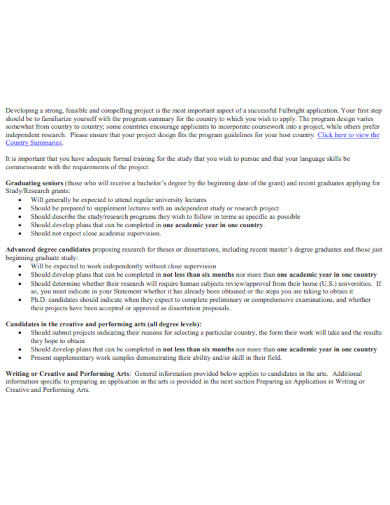
2. Sample Study Plan for Scholarship Application
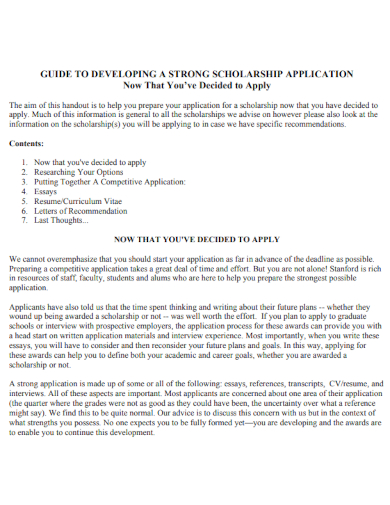
3. Bachelors Study Plan for Scholarship Application
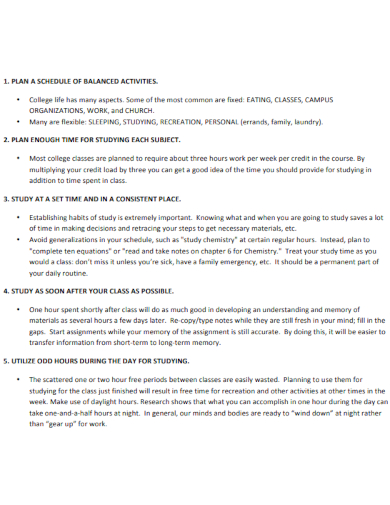
4. Masters Study Plan for Scholarship Application
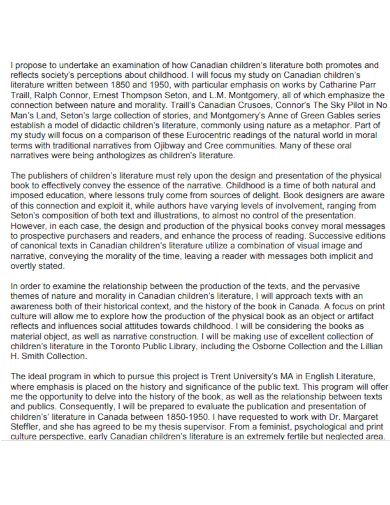
5. Study Plan for Abroad Scholarship Application
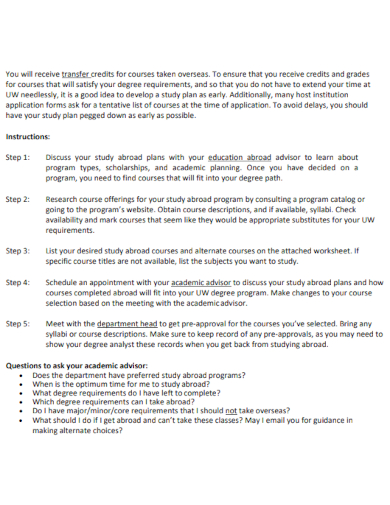
Importance of a Study Plan in Scholarship Applications
Evidence of Proactivity : It provides proof that the applicant is proactive about their education and not just academically competent but also well-organized and thoughtful.
Confidence Booster for Committees : Scholarship committees feel more confident about investing in students who show clear intent and preparedness towards their educational endeavors.
Framework for Success : The study plan acts as a framework that can significantly enhance the applicant’s ability to achieve their educational targets efficiently.
How to Devise an Impressive Study Plan for Scholarship Application?
There are probably hundreds of other hopeful students like you who are also aiming to get the scholarship. If you are one of many, rousing the committee will be a difficult task. One weakness or mistake, and your application documents might end up in the paper shredding machine. Ensure to avoid this unfortunate fate by showing off your essay writing skills with your study plan.
1. Highlight Your Achievements
The first thing you should consider in composing your study plan is to outline your academic achievements and academic background. Yes, you are writing this to impress, but you should also remember to include only honest facts of yourself. If you have received any award certificates for particular programs, you should detail them in your essay. Don’t forget to discuss how these attainments contributed to your decision in choosing their school, the scholarship, and the program/degree.
2. Set Your Academic Goals
The next step in your essay writing process is to talk about your long-term and short term academic goals . The committees will give extra attention to this segment. They will evaluate this as a determining factor to determine whether you are deserving of the scholarship or not. You should also align your academic goals to the degree or program you chose to take.
3. Provide a Timeline
Now that you have presented your goals, you should set aside a schedule or a timeline for each item you listed in your objectives. It is important to stay realistic and to know your limits. Do not set a career timeline you cannot follow. It will put you at a disadvantage in the long run.
4. Detail Your Strategic Study Methods
After discussing what you want to achieve and the period to accomplish it, you should answer the how question. That said, you should enumerate a detailed list of the fruitful study strategies and habits you are willing to implement to achieve what you have written in your study plan. If your applying for an overseas scholarship, you should also include how you plan to learn their language.
What Should I Write in My Study Plan?
Outline your educational background, academic goals, detailed schedule, resource utilization, extracurricular activities, and strategies for maintaining physical and mental health. Emphasize how these elements help achieve your academic objectives.
How Do You Write a Future Study Plan for a Scholarship?
Include long-term academic targets, describe the preparation for major exams, detail intended use of institutional resources, and explain how you will engage with campus life and external opportunities to enhance your career prospects.
How Do I Create a Study Plan?
Start by setting clear, measurable academic goals. Break down your daily and weekly commitments, allocate time for revisions and breaks, utilize academic resources effectively, and incorporate time for extracurriculars to maintain a balanced schedule.
How Can I Focus 100% on Studying?
Create a distraction-free study environment, set specific goals for each study session, use techniques like the Pomodoro Technique for maintaining focus, and incorporate short breaks to prevent burnout and keep your mind fresh.
What is the 9 8 7 Study Method?
This method involves studying for 9 hours a day using a mix of 3 hours for new topics, 3 hours for review, and 3 hours for practice problems, followed by 8 hours of sleep, and 7 hours of relaxation, meals, and personal tasks.
What is the Study Plan for Student?
A student’s study plan should include a realistic schedule that balances study hours with classes, assignments, and exams. It should also outline strategies for effective learning, such as active recall and spaced repetition, and integrate time for rest and extracurricular activities.
How is a study plan essay from a study timetable?
The glaring difference between a study plan essay and a study timetable lies in their formatting. A study plan follows an essay structure, while a study timetable is a visual presentation of your daily or weekly study schedule . In addition to that, a study plan is a scholarship essay that presents your academic goals for the whole duration of your studying in a particular school, while the latter aims to achieve a daily or weekly goal.
What are examples of academic goals for a study plan?
Setting your academic goals in your study plan can be considerably influenced by the type of scholarship you want. If you are applying for a scholarship for a post graduate school program, you can include publishing a educational research in your goals. On the other hand, if you want to apply for an undergraduate scholarship, you can enhance your leadership and communication skills by joining extracurricular clubs and activities. You can also aim to achieve a certain GPA that you think is reachable for you
What are some productive study methods?
The first tip that you should consider is to look for a study-friendly place. If you have not discovered what type of learner you are, then you should conduct a self-assessment. Doing this will help you know what kind of methods are appropriate for you. In addition, based on the results of your assessment, you should prepare learning materials accordingly. If you learn better when you write, you can prepare notebooks for your notes. On the other hand, if you are an auditory learner, you should opt to prepare abooks. To make studying a routine, you can also construct a five day study plan .
It’s a no-brainer that underprivileged students do not have the same chances of getting a quality education as students from a well-off family. Despite that, there are sponsors, organizations, and universities willing to help open the doors of opportunities to these students. That said, once you come across this situation, exhaust all your efforts by composing an outstanding study plan for scholarship application.
Text prompt
- Instructive
- Professional
Create a study plan for final exams in high school
Develop a project timeline for a middle school science fair.
- Sample Research
FREE 10+ Research Study Plan Samples in PDF

Are you working on your thesis or PhD study plan? If you are starting on your thesis or PhD study plan, perhaps you may feel some kind of pressure to work accordingly with a considerable amount of concentration and accuracy. To be a trustworthy researcher, you need to have a clear insight on the nature and primary target of research, the right selection of research methods, and many more important factors. What are the things you need to do in writing a research study plan ? In this article, we have some downloadable plan samples to guide you. Keep on reading!
Research Study Plan
1. research study plan template, 2. quantitative research plan template, 3. sample research study plan form, 4. master’s research study plan template, 5. simple research study plan, 6. thesis research study plan form, 7. proposed plan for research sample, 8. educational research study plan, 9. printable research study plan, 10. individual study plan template, 11. graduate research study plan sample, what is a research study plan, how to write a research study plan, 1. start building your desired goals , 2. develop an action plan, 3. construct essential research strategies, and project planning activities, 4. execute and revise your plan , what are the major elements of a research study plan, what is a good research plan, what are research methods, what are the four study skills.
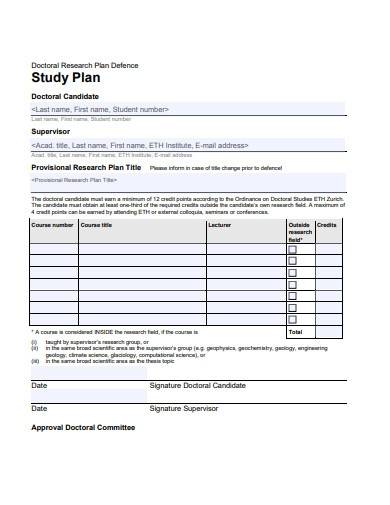
Size: 83 KB
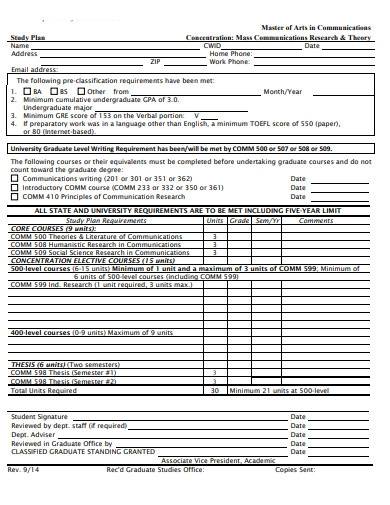
Size: 135 KB
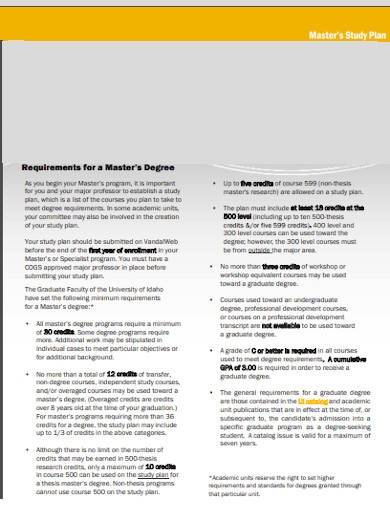
Size: 11 KB
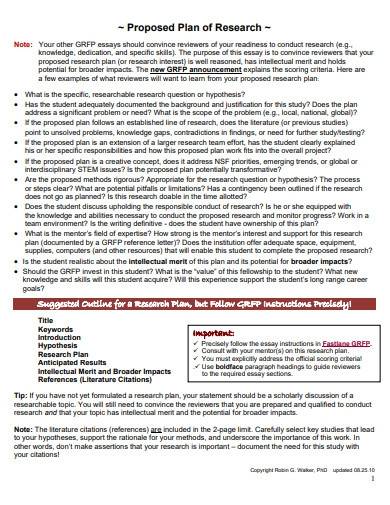
Size: 65 KB
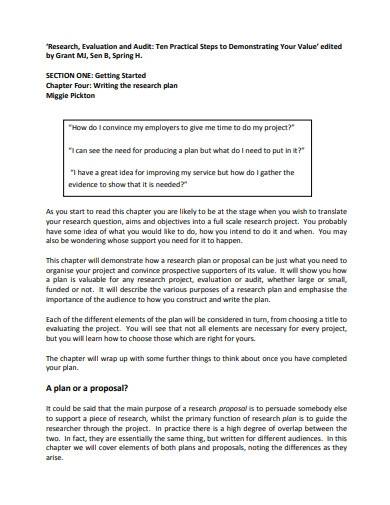
Size: 645 KB
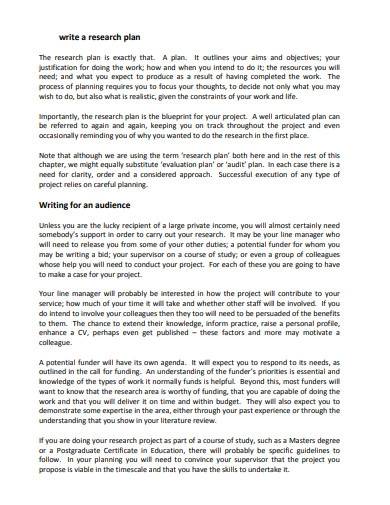
Size: 397 KB
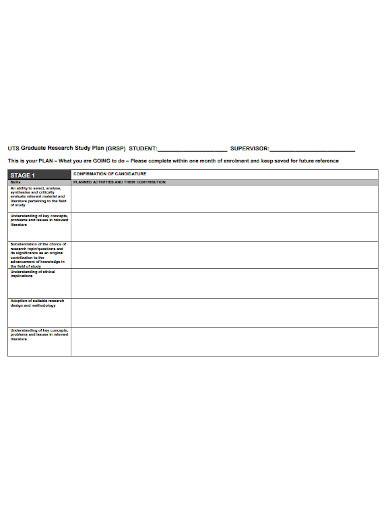
Size: 92 KB
A research study plan is a principal document lwhich is typically used to develop thesis, PhD plan, or other outputs of exploration. It also clearly demonstrates valuable interpretations of new ideas and concepts on a specific research project in a structured manner.
This is an all-inclusive guide written by professionals such as educators, scientists, medical practitioners, researchers, college students, graduate students, and many others in collaborating to their peers and other colleagues. Some examples of this document are PhD research plan, PhD research proposal outline, etc.
When writing a comprehensive research study plan for thesis or PhD, you need to maintain a systematic approach when it comes to developing the subject of your research study. So, you need to use your intellectual capability, critical analysis, and many more. Below are some helpful tips in writing an effective plan :
Walt Disney said: “A person should set his goals as early as he can and devote all his energy and talent to getting there. With enough effort, he may achieve it. Or he may find something that is even more rewarding.” Think deeper and get useful information while you start building your goals and objectives. We suggest that you contemplate the results you want to accomplish.
After building your research goals, you need to develop an effective action plan . For your research project , you must list down the necessary steps to be followed. Also, determine the materials, resources, and references that will be significant in your study plan.
The third step is to construct the essential research strategies and project planning activities to include in your plan for your research study. Some research strategies that you can use are exploration, testing and problem solving linked with your research goals and objectives. Determine your study requirements, as well as the status of your resources. Then, organize your tasks for your research process with some charts, graphs, tables, and other visual diagrams.
What do you need to do in order to execute your strategy? Make sure to keep your focus and fully support your major research goals of your plan . It is highly recommended that you apply the 80/20 principle and concentrate on the 20% that are your essentials. Avoid performing activities, tasks, reports, meetings, or projects that are irrelevant to your plan.
Be systematic and communicate proactively with your team members by consulting with others, especially if you need to know the real condition of your study plan from the perspective of others. This is important for reviewing and revising your plan, avoiding the possibility of any misunderstandings on your part.
The major elements of a research study plan are significant definitions, the general approach, a literature review, conceptual frameworks, the research questions and hypothesis.
A good research plan should contain clear and short introduction to the research field, topic relevance, and various kinds of methods used to attain results such as framework, new technical solutions, etc
Research methods are specific processes or techniques which are being used in collecting data or evidence for analysis to be able to reveal new information or develop better understanding of a particular topic.
The four study skills are effective reading, critical reading, styles of writing, getting organized, and note-taking.
In conclusion, writing an effective research study plan for your dissertation project or planning your PhD is a valuable way to gain success in your thesis, PhD program, or any research project you may have for the moment. Pablo Picasso said: “Our goals can be only reached through a vehicle of plan, in which we must fervently believe, and upon which we must vigorously act. There is no other route to success.” To help you in this matter, here are some of our downloadable and printable action plan samples available in different kinds of formats. Simply click the templates in this article and start downloading now!
Related Posts
Free 7+ sample seo plan templates in pdf ms word, free 10+ patient case study samples & templates in ms word ..., free 7+ sample research project templates in pdf ms word, free 8+ research agenda samples in pdf, free 9+ statistical analysis plan templates in pdf ms word, free 6+ sample self care assessment templates in pdf ms word, free 10+ marketing research proposal samples & templates in pdf, free 8+ market research samplesin pdf ms words | apple pages, free 11+ sample daycare business plan templates in ms word ..., free 10+ critical review samples in pdf ms word, free what should be included in a marketing plan [ how to write ..., free 24+ marketing plan templates in pdf, free 9+ sample sharing plan templates in pdf, free 15+ study schedule samples & templates in pdf ms word ..., free 7+ sample weekly timetable templates in pdf ms word, free 11+ research agenda samples and templates in pdf ms ..., free 12+ case study summary samples & templates in pdf, free 8+ sample research log templates in pdf ms word, free 10+ market research plan samples & templates in ms word ....

IMAGES
VIDEO
COMMENTS
PhD Plan of Study Template (Effective Fall 2019) PhD Plan of Study Your Name Date (Note that each time your committee meets, you should present them with an updated plan, and document such updates. Please remember to change the date with each revision) Department of Communication and Film University of Memphis Advisory Committee COMM Prof., Advisor
what you plan to study - be as specific as possible) 你的专业和研究方向。 (请 说明你的专业和学习计划 - 要尽可能具体) 2) Advisor or Potential Advisor (required for all graduate students). 导师或有意向 的导师 (研究生必须提供)。 3) Please provide a complete list of all the courses you will attend ...
Creating a timeline for a 3-year PhD program requires careful planning, as you'll have multiple milestones and tasks to complete. This timeline may vary depending on your specific field, institution, or country, but here is a general outline you can use as a starting point: Year & Quarter. Activity/Milestone.
Example: Planning year 2 of a 3-year PhD. Maria completed her first round of data collection according to plan, and starts the second year of her PhD with a lot of material. In her second year, she will focus on turning this data into two journal articles. Months 1-2: Maria works on her data analysis.
Doctoral Plan. 1. 5. Detailed Work Plan. Describe the studies or experiments envisaged to reach the set goals. Present your work plan in the form of work packages (WP), each defining the task and describing the methods used and the expected outcome. In general, a work package should describe 3 -. 12 months of work.
Learn how to create a GANTT chart for your PhD research plan, a graphical representation of your goals and objectives with time duration. Find out the common objectives, tips and custom writing services for PhD research.
Learn how to prepare a research plan for your PhD with steps, goals, problems, solutions and timeline. Download a ready-to-use template and see examples of research plans.
A Template To Help You Structure Your PhD's Theoretical Framework Chapter. In this guide, I explain how to use the theory framework template. The focus is on the practical things to consider when you're working with the template and how you can give your theory framework the rockstar treatment. Use our free tools, guides and templates to ...
Rather, it should be designed by you to help guide your study process and goals. 2. Write on the calendar. If at all possible, create daily and weekly plans for staying on track with your assigned classes as well as other responsibilities (family, housework, gym membership, etc). 3. Make your study plan visible.
Project description. The description should be one to three pages, written by the PhD student and approved by the supervisor. The description may be included in the form, or attached as an appendix. Start with an introduction describing the project in a broader context. Give the background and motivation for the topic of the PhD project.
Computer Science Plan of Study Templates. 2023-2024. Computer Science PhD Template ... 2022-2023. Computer Science PhD Template Computer Science MS Non-Thesis Template Computer Science MS Thesis Template Digital Forensics MS Non-Thesis Template Digital Forensics MS Thesis Template
A research proposal should present your idea or question and expected outcomes with clarity and definition - the what. It should also make a case for why your question is significant and what value it will bring to your discipline - the why. What it shouldn't do is answer the question - that's what your research will do.
It is a less. structured parallel to the Time Schedule that fo llows later. Phase 1: Get full and in depth understanding of the theoretical framework outlined in this study plan and the MC ...
Research plan of up to 5 pages, including a description of the objectives and research questions, state of knowledge and finally an evaluation of the qualification of the applicant to conduct the planned research. Please use the format below. (Note that the bibliography is not included in this part.) 2. Study plan (1-2 pages). 3. Financial plan.
Therefore, in a good research proposal you will need to demonstrate two main things: 1. that you are capable of independent critical thinking and analysis. 2. that you are capable of communicating your ideas clearly. Applying for a PhD is like applying for a job, you are not applying for a taught programme.
Study Plan for Phd Students - Free download as PDF File (.pdf), Text File (.txt) or view presentation slides online. 1. The document outlines a full time 3-year PhD plan consisting of coursework and research activities organized into 6 semesters. 2. In the first year, students will undergo research induction, review literature, develop their research proposal and methodology, and conduct a ...
How I Made My PhD Completion Plan on Excel (With Template) For the last few weeks, I've been working on my PhD completion plan. It's basically an excel spreadsheet that I'm using to track my progress and plan my time for the remainder of my PhD. My thesis is due August of next year (with a 6 month extension) so the clock is definitely ticking.
Summer, year three. Oral Ph.D. candidacy examination. Math 799 Doctoral Research and Dissertation. First semester, year four. 700-level seminar or reading course. Math 799 Doctoral Research and Dissertation. Second semester, year four. Math 799 Doctoral Research and Dissertation. Summer, year four.
Sorting Position. 41. Learn more about the tips for writing proposed research plan to prepare your application.
A comprehensive research proposal is one of the most important parts of your PhD application, as it explains what you plan to research, what your aims and objectives are, and how you plan to meet those objectives. Below you will find a research proposal template you can use to write your own PhD proposal, along with examples of specific sections.
A doctoral study plan template for the School of Engineering and Natural Sciences at the University of Iceland. A repo for issues and updates is here: htt... An online LaTeX editor that's easy to use.
Objective: To thoroughly understand the criteria and expectations of the scholarship. Action Plan: Review the scholarship guidelines weekly to ensure all requirements are met and align activities to the scholarship's objectives. 2. Setting Academic Goals. Objective: To achieve a GPA of 3.8 or higher each semester.
Proposed Plan for Research Sample. 8. Educational Research Study Plan. 9. Printable Research Study Plan. 10. Individual Study Plan Template. 11. Graduate Research Study Plan Sample.